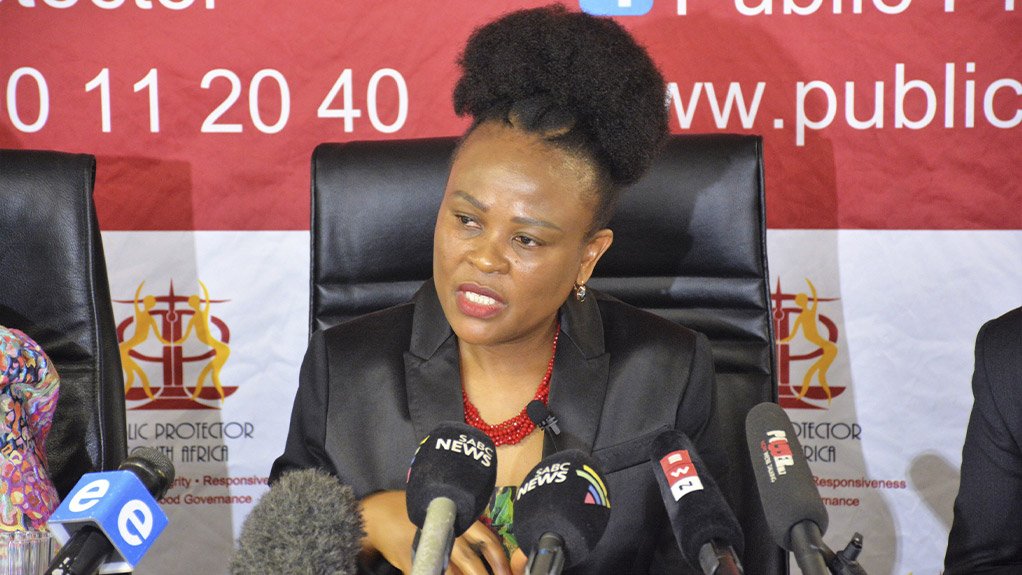Public Protector Busisiwe Mkhwebane says the National Student Financial Aid Scheme (NSFAS) needs to urgently find solutions and address issues that lead to frustrated students each year, resulting in protests.
Mkhwebane was speaking during a webinar hosted by her office on Tuesday, in collaboration with the SA Human Rights Commission, under the theme: Protecting the right to higher education.
The webinar touched on various issues facing the sector; lack of funding for deserving students, the role of NSFAS and the work it is doing, and how frustrated students end up on the streets protesting.
Mkhwebane's deputy, Kholeka Gcaleka, also attended the virtual discussion alongside other education stakeholders.
Among the panellists at the webinar were the Department of Higher Education and Training's deputy director-general of university education, Thandi Lewin, NSFAS CEO Andile Nongogo, SA Union of Students secretary-general Lukhanyo Daweti, and the head of operations and sector support at Universities South Africa, Linda Meyer.
Mkhwebane said her office had received around eight complaints on NSFAS in 2020 and was investigating the issues.
The complaints related to, among others, inadequate allowances being paid for study material and late payments for student allowances, she added.
The Public Protector said her office had also heard horror stories about students having to sleep in toilets because of a lack of funding from the scheme.
Responsive state institutions
"We also have an ongoing investigation stemming from allegations that NSFAS incurred irregular expenditure amounting to R7-billion, failed to assist students, in that it lacked the ability to raise and recover loans, and lacked the ability to disperse correct amounts of monies…"
She added her office was currently investigating the issues and would be addressing them at a later stage.
"The main issue which is also frustrating and leading students or anyone to be agitated, which we always try to make sure, or engage on every time - and is part of the vision 2023 of the Public Protector, is that state institutions need to be responsive," Mkhwebane pointed out.
She said reports about NSFAS not being responsive to students via email and its other systems were a concern and needed to be addressed.
"That should be prevented and should be dealt with speedily. Secondly, [NSFAS must find a solution to issues] and that solution should be addressed as a matter of urgency because we are now six months into 2021, and surely we should be ready by now or by September to make sure we don't have a repetition of what is happening throughout the years."
While Nongogo pointed out legacy systems and how they operated and were now changing, Mkhwebane said NSFAS needed to consider how it could integrate and utilise government systems to assist it in its work.
She added: "We are still not integrated. But we will have a way forward. One way forward is for us to have a process where we mediate and identify the issues which can be dealt with speedily.
"But then there would be those issues, which we would have to conduct an investigation and make sure that we come up with recommendations and those will be recommendations, which would be implementable."
Gcaleka pointed out that from observation and based on reports the office received, it was clear student protests were based on challenges faced mostly by those classified as the missing-middle.
Nongogo said at an administrative level, NSFAS was currently reviewing its structure and embarking on system improvements.
"We have started by improving the key modules that are used for NSFAS, namely those that relate to the payment of students. We are improving our application portal such that we are able to make real-time decisions as and when students are applying."
He added internal systems, processes and policies were also being reviewed.
"But at a student funding level, the board has looked at a number of policy issues that are affecting students; issues of appeal, issues of student accommodation, issues of the actual funding threshold, progression, and issues of aligning the rules to the bursary scheme," Nongogo said.
Gcaleka added the office had completed collecting information and reports on issues faced by the sector and was ready to start with its mediation process.
"What we want to achieve as Public Protector South Africa is a strengthened democracy. A democracy where its children are not protesting for their rights in the manner in which their forefathers had done.
"This democracy, its fruits must be enjoyed by their children and gates of higher learning must be open to all who are eligible to accessing the institutions of higher learning," the deputy Public Protector said.
EMAIL THIS ARTICLE SAVE THIS ARTICLE
To subscribe email subscriptions@creamermedia.co.za or click here
To advertise email advertising@creamermedia.co.za or click here











